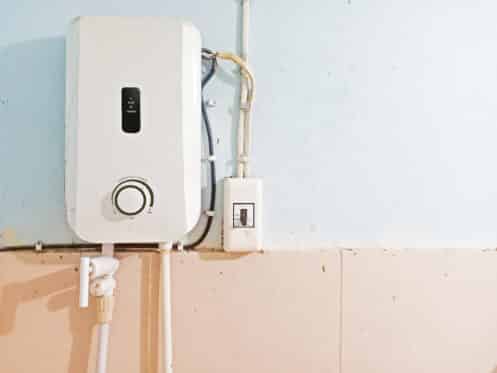Most homeowners do not think very much about their water heater. As long as it functions properly, it is out of sight and mind. But one morning you turn on the shower to start your day and find that there is no hot water, leaving your family to brave icy showers.
In the best-case scenario, a homeowner calls Allbritten and is able to get a same-day appointment and only has to go the morning without a hot shower. In the worst-case scenario, the old water heater tank has been damaged and is leaking gallons of water, causing more damage by the minute.
Thankfully, some very clear signs let you know it’s time to start looking for a new water heater. Generally, a traditional water heater is going to last between 10 and 15 years. If your water heater is getting close to that milestone, now is the time to start thinking about making an upgrade.
Something nice, though, is that over the past few years, the technology in water heaters has improved. The one you purchase now will heat better, use less energy and likely be more compact than the one you purchased almost two decades ago.
New Water Heaters Are More Efficient
New water heaters have less waste and save more energy. This is because they are better insulated and require less heat time. In addition to saving you money, a high-efficiency water heater has lower greenhouse emissions. When it comes time to replace your existing water heater, talk to your water heater professional about the Uniform Energy Factor (UEF) rating. This number will tell you how much energy the water heater you are considering will use to produce hot water. The larger the number, the more efficient your new water heater will be.
Heat Water Quietly
Older water heaters were surprisingly noisy. As your water heater has aged and had some malfunctions, it likely has gotten much noisier. Since your existing water heater makes noise constantly, you’ve likely become accustomed to it. However, it can be a shock to homeowners to hear how reduced the noise is when they replace their old water heater with a new one.
Some sounds are just byproducts of the water heater’s functioning. However, if you hear rumbling and knocking noises in your existing water heater, sediment buildup has likely hardened on the bottom of the tank. This is not a normal sound, and you should call your plumber to have them check it out.
More Space
The water heaters manufactured 30, 20 or even 10 years ago were bulky. However, new water heaters have been streamlined. Tankless units are small rectangular boxes that are mounted on the wall. This gives you so much more storage space.
Most tankless water heaters take up around 24 square inches of space and are around 10 inches deep. A tankless water heater is not the right option for everyone. However, talking to your plumbing professional can help you understand the pros and cons and decide if going tankless is right.
Enjoy Showers Longer
When a homeowner’s hot water tank breaks, it’s frustrating to not be able to do laundry with hot water or wash dishes with hot water. However, one of the biggest causes of frustration is not having a hot shower, especially if the weather is cold outside.
Even if your water heater is working perfectly, but it’s not the right size for your home, you may still be dealing with that same frustration of not having enough water for everyone in your home to enjoy a hot shower.
Newer water heaters have an improved recovery rate. This means the hot water replenishes faster, so multiple family members can take back-to-back showers without anyone getting stuck with a cold shower.
A tankless water heater unit offers hot water on demand. As long as the water heater has a fuel source, be it natural gas or electricity, there is no end to the hot water supply.
Advanced Safety Features
As water heater technology has advanced, so have the safety features used in the heaters. The days of worrying about unexpected leaks or tank explosions are gone. Most modern models have temperature and pressure relief valves. This eliminates potential explosions. Additionally, they are equipped with sensors, including automatic shutoff valves, that will deactivate the unit if the smallest leak is detected. These safety features mean you can use your new water heater confidently without concerns or risks.
How To Determine When To Upgrade Your Water Heater
When dealing with large appliances, assessing the advantages and disadvantages of a major repair is crucial, especially as the appliance approaches the end of its lifespan or is prone to frequent breakdowns. In some cases, a water heater may be covered by a home’s warranty or homeowner’s insurance, but even without such coverage, investing in a reliable water heater is essential, given the amount of its daily use.
Running Out of Hot Water Frequently
Running out of hot water more than once a week is a clear sign that it’s time to upgrade your water heater. This issue may arise because the water heater is too small for your family’s needs. If adjusting the temperature doesn’t resolve the issue, consider upgrading to a water heater that is at least 20 gallons larger than your current one. As a general rule, an 80-gallon tank may be needed for a family of four, up from a 60-gallon tank for a family of three.
Desire for Improved Energy Efficiency
If you’re seeking a more energy-efficient option, upgrading your water heater is wise. While you may not need to replace the entire system, choosing a tank with enhanced insulation can help maintain hot water at the desired temperature more efficiently. Upgrading to a new water heater can also reduce the time it takes to reheat the water when the supply runs low. Tankless units, geothermal water heaters or solar water heaters may be attractive options, with many homeowners finding tankless units particularly appealing for their unlimited hot water access.
Increasing Noise Levels
Ignoring or becoming accustomed to noises from aging appliances is common, but increasing noise levels indicate a mechanical system malfunction when it comes to your water heater. A rumbling sound in an older water heater is often a sign of a thick layer of sediment on the tank floor, reducing efficiency, increasing vulnerability to damage and risking a breakdown.
Leaks from the Water Heater
As the water heater ages, the likelihood of leaks increases. A leaking water heater signals the end of its lifecycle, possibly caused by the expansion and contraction of metal inside the tank after numerous heating cycles. Loose fittings or issues with the pressure overflow pipe could also contribute to the problem. In such cases, upgrading to a new water heater is typically necessary.
Plumbing, Heating & Cooling in Fresno, CA, and the Surrounding Area
At Allbritten, we have been offering quality plumbing and HVAC services since 1932. We are proud of our role in helping residents feel comfortable in their homes. We offer incomparable customer service and quality craftsmanship. We have NATE-certified technicians and have won several awards backing up the quality of our work.
We’re the Central Valley’s one-stop-shop for home comfort. Our services include general plumbing installation, maintenance, and repair. We install water heaters, including tankless water heaters. We offer HVAC installation, maintenance, and repair. We do indoor air quality testing, offer home energy audits, and install insulation. Contact Allbritten today at (559) 384-0725 and see for yourself why our services are so highly sought after.



